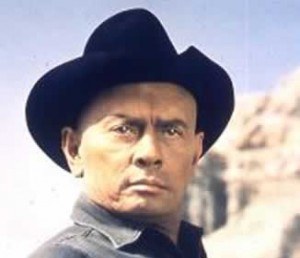I watched Westworld again recently, a Michael Crichton film from 1973 in which two characters go on holiday to a mock Western resort, populated by gun-toting robots. Holiday-makers can live out their fantasies of being cowboys, and shoot these robotic residents: alas, one of the robots malfunctions in a shoot-out and pursues the pair throughout the film on a relentless quest for revenge (the robot in question played with menacing remorselessness by a fantastic Yul Bryner.)
The formula of historical theme-park-going-wrong is one Crichton would repeat with greater commercial success with dinosaurs in Jurassic Park, and to a certain extent in the disappointing novel Timeline with knights.
Seeing the film again made me reflect that its whole scenario is akin to the way in which we perceive our own history, and how sometimes we experience it. Much of our view of history can come from film and literature – think of the multitude of Vietnam films such as Platoon or Full Metal Jacket, or Norman Mailer’s Vietnam-novel The Naked and the Dead,or Ridley Scott’s swords-and-sandals vision of Rome in Gladiator.
Our learning about the past can come filtered though the film-maker’s lense – Spielberg’s account of the Holocaust in Schindler’s List – or the novelist’s imagination – Bernard Cornwell, Henry Treece, etc.

Re-enactments and displays are popular ways of bringing historical events to some sort of ‘life;’ mock jousting tournaments at English Heritage castles across the country, or air displays featuring the dwindling number of aircraft from World War II. Like Crichton’s automaton-populated holiday resort mock-ups, these create an artificial snapshot of a generalised sense of a moment in the past, and purport to bring it to life for popular consumption.
But are we losing a real sense of our past, our history, buried under (or papered over by) a fictionalised representation of it ? And, like the remorseless robot in Westworld, will populist reinventions of our past, in representing it, actually destroy us in the end ?
Real history – if it possible to define something which we haven’t experienced for ourselves, because it occurred before we were born, as such – is being eroded by our reinventions, or re-imaginings of it; the glare of Hollywood’s limelight fails to illuminate most of history’s shadowed corners: in fact, it creates those obscuring shadows precisely because it spotlights heroes and villains for our entertainment. The same strobe lighting up the hero necessarily blinds us to the realities lost out of sight beyond the lit circle in which they stand.
Ironically, it’s almost as if the very media working to preserve history, whether for our education or entertainment, are instead serving, as the writer and cultural analyst Fredric Jameson puts it, ‘as the very agents and mechanisms for our historical amnesia.’ (‘Postmodernism and consumer society’ in Gray & McGuigan, 1993: 205.) Fredric makes this point in relation to the function of news media, but arguably it’s also a pertinent definition of the methods by which film, television and historical novels are making history disappear in the very act of trying to bring it alive.
Where has our past gone ? Or, more accurately perhaps: where did we begin to erase it ?
Posted by Dan Harding, Deputy Director of Music at the University of Kent. Click here to read his music blog, ‘Music Matters.’
